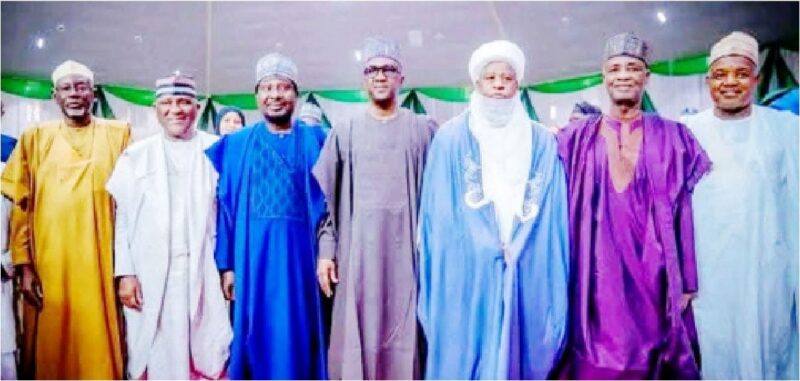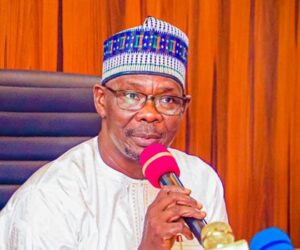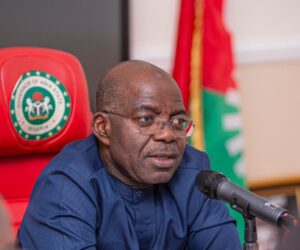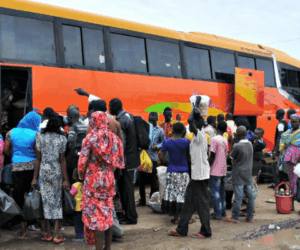A Senior Fellow, Centre for Democracy and Development, Abuja, Prof. Jibrin Ibrahim has warned that the future of Northern Nigeria is on a perilous trajectory unless urgent reforms are undertaken.
Speaking on “Arewa in the Next 25 Years,” at the 25th Anniversary of the Arewa Consultative Forum (ACF) in Kaduna on Saturday, Prof Ibrahim emphasised the need for trend analysis—a systematic study of likely futures based on current social, political, and economic data—to guide policy and leadership.
His analysis paints a bleak picture, predicting that insecurity will escalate, forcing ACF and other organisations to relocate events outside Kaduna, possibly to Abuja or even abroad.
SPONSOR AD
The proliferation of small arms among civilians, he warned, could turn the region into a theatre of violence, starvation, and lawlessness.
Highlighting the failures of past governance, Prof. Ibrahim recalled the 1965 Grazing Reserve Law aimed at preventing farmer-herder conflicts and the World Bank’s 1993–94 West African Long-Term Perspective Study, which predicted demographic, educational, and socio-economic challenges now unfolding.
He warned that Northern Nigeria faces the highest poverty rates, a growing youth bulge, and mass educational deficits, creating a precariat prone to violence.
The solution, he stressed, lies in leadership and governance reforms, saying effective leaders must combine integrity, competence, and civic-mindedness, prioritising public service over personal enrichment.
He said Nigeria needs policies to equip security forces, promote social cohesion, improve education, and expand economic opportunities.
Prof. Ibrahim said futures studies should guide Arewa and Nigeria away from destruction, urging ACF to commission comprehensive analyses to chart a sustainable path forward, drawing inspiration from the discipline and vision of early Northern leaders like Ahmadu Bello.
Bad policies, dead power grid killing North – Dangote
Northern Nigeria’s industrial decline and worsening insecurity are the predictable outcomes of years of failed policies and chronic power shortages, Africa’s richest man, Alhaji Aliko Dangote, said, urging northern leaders to take urgent, coordinated action before the situation spirals beyond control.
Dangote said the North’s economic collapse is not a mystery but the direct result of unstable government policies, poor planning and an electricity system incapable of supporting meaningful industrial growth.
He recalled commissioning Arthur Andersen, now part of KPMG, to investigate why once-thriving northern companies, especially textile industries, failed despite strong beginnings.
He said inconsistent policies had destroyed investor confidence. “Imagine getting ready to score a goal and someone suddenly tells you the goalpost is behind your back. That’s how unpredictable government policy has been,” he said.
The business magnate identified chronic power failure as the second major factor crippling northern industries.
He disclosed that the Dangote Group avoids connecting any of its plants in Nigeria to the national grid due to its unreliability, noting that only South Africa and Ethiopia provide electricity stable enough for industrial operations.
According to him, meaningful economic growth is impossible without a reliable power supply.
He added that high interest rates and the soaring cost of capital have further made industrialisation almost unattainable for new entrants without significant personal funds.
Dangote urged northern leaders to adopt a consistent development strategy anchored on education, agriculture and industry, aligning with the transformation blueprint earlier outlined by former Vice President Atiku Abubakar.
He said the North has the land and population to become West Africa’s agricultural powerhouse, but has failed to harness this potential due to years of inconsistent investment and weak planning.
He stressed that the region’s insecurity, including banditry and widespread youth unemployment, is the direct consequence of neglecting critical sectors for too long.
“All the issues we are facing today would not be happening if we had done the right things. Everyone of us shares the blame, myself included,” he said.
Dangote warned that without swift intervention, the crisis will eventually swallow everyone.
“If we don’t resolve these issues, they will consume every one of us, whether we are guilty or not,” he said.
He added that although the ACF’s 25th anniversary is worth celebrating, the moment must also serve as a wake-up call for northern leaders to collectively chart a new, sustainable path for the region’s economic and security future.

Unity key to ending North’s insecurity – Sultan, Gowon, others
Northern leaders have reaffirmed the need for strengthened national unity amid rising insecurity across the country.
They spoke on Saturday in Kaduna at the 25th anniversary celebration of the Arewa Consultative Forum (ACF), where they noted that the large and diverse attendance underscored a shared commitment to national cohesion.
The Sultan of Sokoto, Alhaji Muhammad Sa’ad Abubakar III, said the turnout demonstrated the seriousness of stakeholders in safeguarding both Northern and national unity.
“Our presence here today is a big testament that we care for the North, we care for Nigeria. We are here for the unity of the North; we are here for the unity of Nigeria,” he said.
Describing the gathering as more than an anniversary, he said it served as “a programme cementing the unity of Nigeria.”
He added that Nigerians had lived together for centuries, and the event further strengthened that bond.
He urged citizens to embrace the philosophy that “we can be united without being uniform,” recalling Sir Ahmadu Bello’s counsel that differences should be understood rather than ignored.
The Sultan cautioned against antagonism in national affairs, remarking, “You don’t have to antagonize anybody to get what you want.”
Reaffirming the role of traditional rulers, he stated that they must continue to support governments at all levels and remain committed to peacebuilding. While noting that Nigeria does not lack solutions, he stressed that “what we lack is always implementation.”
The Sultan urged the ACF to approach its next 25 years with introspection and renewed determination, asking, “What have we done in 25 years, and what do we need to do in the next 25?”
North’s insecurity threatens national progress, stability — Tinubu
President Bola Ahmed Tinubu said insecurity in Northern Nigeria remains his greatest concern, emphasizing that the crisis poses a significant threat to national progress and stability.
He warned that “Unless trust is rebuilt, security challenges will persist, economic stagnation will deepen, and educational deficits will widen.”
Represented by the Speaker of the House of Representatives, Abbas Tajudeen, the president in his address titled ‘A Generation Summoned by a Crisis’, acknowledged that his administration inherited multilayered security challenges but is addressing them with renewed urgency.
“Nothing troubles me more gravely than the security crisis bedevilling Nigeria, especially Northern Nigeria. Affliction in any part of the country is a setback for every part. We cannot prosper when one limb of the national body is paralysed.
“The layers and sophistication of the security challenges we inherited are daunting, but what should inspire confidence is the urgency with which my administration is pursuing solutions,” he said.
According to him, there has never been a time when the North more urgently needed honest, courageous voices than now.
“Yes, there have been missteps. Yes, there have been moments of drift. But we cannot say the North has failed unless we abandon our responsibility to be our brothers’ and sisters’ keepers.
“But let no one believe that hope is lost. The dysfunction inherited over decades fractured bonds and strained unity. Yet the ethnic and religious diversity gathered here today is a declaration of the collective resolve to overcome polarisation and resist any agenda designed to divide,” he said.
Speaking further, the President reiterated his administration’s commitment to restoring peace and prosperity across the region.
He expressed determination to ensure that terrorist and bandit groups tormenting the North are eliminated.
He also expressed confidence in the North’s future potential, saying he looks forward to the day when the first tankers of crude oil from Kolmani and other Northern oil fields roll out.
Reflecting on the generational responsibility before Nigerians, he observed that each era has its unique challenges.
He noted that the current generation faces “one of the gravest tests of its endurance, the corrosion of security, the erosion of communal values, and the distortion of the moral compass that once held communities as one family.”
Tinubu also commended the ACF, saying that for 25 years, it has remained a moral and intellectual force in Northern Nigeria. “It has assembled patriots, brilliant minds, moral fortresses, and selfless negotiators whose dedication has ensured that the North remains a central pillar in every serious national conversation.”
North risks stagnation, deepening insecurity without unity, clear vision — Atiku
Former Vice President Atiku Abubakar has warned that Northern Nigeria risks stagnation and worsening insecurity unless its leaders urgently rebuild unity, set clear priorities, and confront the region’s deepening developmental challenges with courage.
Atiku said the ACF’s survival for 25 years reflects its value, but stressed that the North must move beyond nostalgia to embrace honest reflection and decisive action.
He praised past ACF leaders who “weathered enormous political and social storms,” urging current leaders to uphold their legacy.
Recalling the divisions of 1999, Atiku said he initiated broad consultations and set up a reconciliation committee led by the Emir of Ilorin, Ibrahim Sulu-Gambari, to unite various northern blocs. The effort culminated in the formation of the ACF under the leadership of Gen. Yakubu Gowon and the late M.D. Yusufu.
Atiku noted that the forum was designed not only for political alignment but to drive development in line with Sir Ahmadu Bello’s vision of prioritising education, agriculture, and industry—goals he said remain urgent today.
He cited the Northern Education Project, which exposed alarming declines in learning outcomes and led to reforms that improved enrolment and transition rates in several states.
Through the Northern Development Project, he said efforts were made to modernise agriculture and address climate-related threats, while a survey of industrial constraints highlighted persistent challenges such as poor power supply, limited financing, and multiple taxation.
Atiku warned that enemies were exploiting diversity, fear, and disinformation to divide the region. He urged northern leaders to learn from countries that have successfully managed diversity while achieving economic growth.
He urged unity and visionary leadership, saying the North must choose whether to build a legacy of service or remain complacent.
Unity is North’s greatest contribution to Nigeria — Gowon
Former Head of State, General Yakubu Gowon, has called for a bold new Northern agenda anchored on unity, security, agricultural transformation, and accountable governance.
His message, delivered by former Vice President Namadi Sambo, urged ACF to remain committed to the values that have long sustained Nigeria’s stability.
Gowon praised the ACF’s founding vision, recalling that the Forum was established at a time when the country faced “dangerous challenges that were worsening with each passing day.”
He said its founders acted with “the highest standards of patriotism and sacrifice,” creating a platform that has since served as a beacon of unity in moments of national uncertainty.
He stressed that unity remains the North’s greatest contribution to Nigeria’s survival. “Without unity, we fracture. Without peace, we stagnate. And without harmony, we fail to realize our immense God-given potentials,” he warned.
Gowon urged Nigerians across all regions—“from the creeks of the Niger Delta to the beaches of Lagos”—to emulate the ACF’s commitment to peace, dialogue, and national cohesion.
He commended the Forum for remaining a “steadfast anchor” amid shifting political currents and encouraged its leaders to continue upholding the politics of inclusiveness and national solidarity.
North must leverage presidential support to tackle insecurity — Barau
Deputy President of the Senate, Barau Jibrin, has affirmed that President Bola Ahmed Tinubu has remained unwavering in his support for the interests and development of Northern Nigeria, stating that the region has never submitted any request to him without receiving prompt attention and concrete action.
Barau said President Tinubu has consistently demonstrated goodwill towards the North, backing key interventions in security, agriculture, and education, and responding swiftly to issues affecting the region.
Barau said the North must acknowledge and leverage this presidential support to resolve its longstanding challenges, especially those related to insecurity.
He emphasised that the president’s attentive ear and willingness to act had placed the region in a unique position of advantage within the current political landscape.
He said the worrisome projections contained in a trend analysis presented at the ACF’s event by Professor Jibrin Ibrahim, titled “Arewa in the next 25 years,” will not materialise.
“As long as we put our heads together, we shall take our region and indeed help the country towards prosperity. This is doable. As I said, ACF has a lot to do. Please facilitate this kind of arrangement. Facilitate this forum,” he said.
To address the problem of insecurity in the Southwest, he said stakeholders in the zone came together to form Amotekun, and they successfully dealt with the issue.
“Now, as we speak, the southwest is the safest part of this country, and we can do that here; it’s doable. Therefore, there’s a need for all our leaders to come together, including the governors and all of us,” he said.
He urged northern leaders to come together and take full advantage of increased revenues now accruing to subnational governments, noting that the National Assembly stands ready to support initiatives that can strengthen security and promote development across the region.
Barau emphasised the need for closer collaboration between northern governors, lawmakers, and the ACF leadership, saying such synergy would help refine existing strategies and produce results similar to those in other regions that have successfully confronted their security challenges.
Buratai urges ACF to lead northern renewal
Former Chief of Army Staff and ex-Ambassador to Benin Republic, Lt. Gen. Tukur Yusufu Buratai (Rtd), has said ACF must urgently reinvent itself as the driving force of Northern Nigeria’s next phase of development, warning that the region can no longer afford complacency or overdependence on the federal government.
Buratai described the Forum as “an indispensable pillar for advancing the unity, peace, and progress of Northern Nigeria,” but stressed that the next 25 years require a more assertive, strategic, and visionary role.
Challenging the long-held view of political neutrality within the ACF, he argued that neutrality must not be mistaken for passivity.
“True political neutrality cannot mean the absence of political direction,” he said, urging the Forum to champion a coherent, home-grown agenda anchored on security, good governance, educational advancement, and economic development.
A central theme of his message focused on agriculture and rising food insecurity—an issue he called “a profound paradox.” He said it was indefensible for the region to prioritise spending on intangible projects while neglecting massive agricultural investment, despite its abundant arable land.
Revitalising agriculture, he said, is “an existential imperative,” adding that modern, large-scale farming could eliminate hunger, reduce inflation, and transform northern youths from a security liability into a productive force.
Buratai urged the ACF to become “the primary architect of a new era of Northern prosperity” by developing a long-term blueprint and institutionalising accountability across the region.
The Chairman of the ACF Board of Trustees, Alhaji Bashir Dalhatu, reflected on the Forum’s origins, recalling that the late 1990s and early 2000s were marked by three powerful northern political associations competing for influence. The rivalry created political disunity and coincided with rising violence and intercommunal conflicts.
Northern elders, he said, viewed the environment as dangerous and “unsatisfactory,” as it hindered consultations and consensus-building. With citizens facing mounting pressure and “unfair treatment from some authorities and certain elements who did not wish us well,” leaders agreed that unity had become an urgent necessity.
This led to the historic merger that birthed the Arewa Consultative Forum, established to ensure Northern Nigeria “got its act together and spoke with one voice.” Its founders envisioned an ambitious mandate focused on strengthening unity, building bridges, and resolving disputes that could undermine regional cohesion.
Dalhatu praised the courage of the founding leaders and expressed gratitude for President Bola Tinubu’s decision to send an official delegation to the anniversary celebration.
He condemned the recent surge in violent attacks, including the live-streamed murder of Brigadier General M.U. Ba, the killing of a vice-principal in Kebbi, and mass abductions in Niger and Kebbi states.
“These endless killings and kidnappings are incompatible with our security system,” he said, urging the government to end the violence “rapidly, whatever it takes.”
As a Nigerian living here or in the diaspora, DO YOU HAVE A PLAN B? Just in case anything goes wrong, is there a side business you can fall back on? We show you step by step how you too can start earning US Dollars consistently. Nigerians can now make as much as $20,000 to $35,000 with premium domains. Ideal for business owners, entrepreneurs, and workers.
Click here to find out how it works








